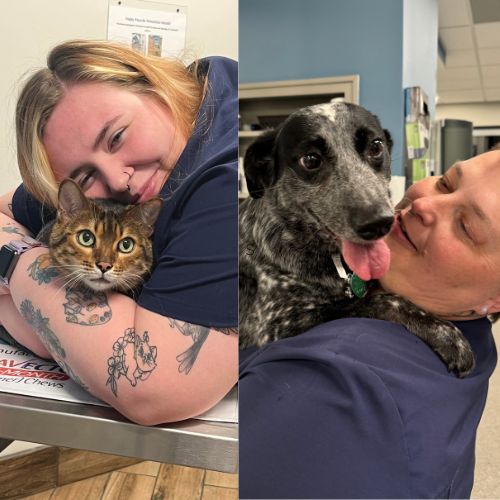‘Tis the season of giving…and eating! The holidays abound with deliciousness: stuffings and dressings, bread, casseroles and cookies, candy, cakes, and pies. Then there’s the bird itself, plus all the rich traditional sides.
One of the things we love most about the holidays is the deep sense of joy and happiness that comes with cooking and sharing meals with our families and friends.
‘Tis also the season to keep a close eye on your pets. When fur babies get in on the holiday fun, it can mean a trip to the emergency vet…or worse.
There are plenty of goodies created especially and safely for pets. You can also make pet-safe recipes! Tori’s dog Kimber eats homemade “pupcakes” with applesauce, peanut butter, and a Milkbone icing—really! Natalie’s dog Muffin enjoys doggie cookies made with pumpkin.
We understand how hard it is to resist that adorable face with those big, sweet eyes. If you absolutely must include your fur baby in the holiday eating tradition, stuff a dollop of plain boiled sweet potatoes, a few plain green beans, and a taste of plain turkey into a feeder toy or bowl. You get it: “Plain.”
Booze, bones, and sweets have no place in your pet’s diet. Here are some of the most dangerous and commonplace holiday foods.

Chocolate
Chocolate is one of the most toxic foods for pets. The main toxic property in chocolate is similar to caffeine. It stimulates the central nervous and cardiovascular systems.
Be vigilant about watching containers, pans, platters, plates, and dishes that may contain chocolate.
If your pet gets into anything chocolate (dark, white, milk, cocoa powder, anything), call us or the emergency vet right away. Try to determine exactly what was ingested. The type of chocolate, such as milk or dark, and the amount consumed are essential factors for treatment.
Cinnamon
Good news: A small amount of cinnamon in food is extremely unlikely to cause problems. Cinnamon powder can still hurt the lungs if inhaled…and cinnamon oil can be a real issue.
Cinnamon essential oil is often found in candles, soaps, wreaths, and ornaments. It can cause vomiting, diarrhea, and blisters in the mouth.
Garlic and Onions
A small bite or lick of a dish with garlic or onion is almost always fine. But ingesting a whole garlic clove or head of onion—like in a mound of mashed potatoes—is really scary. Pets cannot digest the enzymes in garlic or onion. Cats are especially sensitive to garlic.
So follow the simplest, safest advice. Keep food secured in your pantry, cupboards, or refrigerator. Always stay attentive when you’ve got lots of cooking and eating and merriment going on. During this busy festive season, consider putting your pets away in a secluded room with soothing holiday music!
Salt
Even simple table salt can be dangerous to pets; they are much more sensitive to it than people are. The determining factor of salt poisoning is quantity.
One sign your pet has had too much salt is increased thirst. Severe symptoms include vomiting, diarrhea, stumbling, lethargy, confusion, and seizures.
Again, if you simply must include your pet in the holiday meal, keep the meat and vegetables extremely plain—that is: cooked separately, simply, and with no salt or spices.
Bones
Cooked bones are dry and brittle. They can splinter and puncture your pet’s throat, stomach, or intestines.
Eliminate temptation by disposing of or storing bones immediately after carving and finishing the meal.
Fatty Foods
Turkey skin, gravy, and nuts are high in fat and very hard for pets to digest. Fatty food can cause a painful illness known as pancreatitis, which leads to vomiting, diarrhea, and weakness.
Macadamias, pistachios, almonds, walnuts, and pecans are particularly difficult on the digestive system, and some may even be big enough to cause a gastric obstruction in smaller animals.
Grapes and Raisins
The actual toxin in these fruits remains unknown—but we know for sure it is dangerous. In fact, ingesting just a small amount has proved fatal in both dogs and cats.
The initial signs of poisoning from grapes or raisins are vomiting and hyperactivity. Diarrhea, anorexia, lethargy, and depression could follow. Ultimately, the kidneys can fail. Keep all fruit baskets, salad dressings, and other sweet goodies away from your pet!
Xylitol
Xylitol is a sugar substitute commonly used in chewing gum, candy, peanut butter, energy bars, and baked goods. It is particularly toxic for dogs.
Examine your food labels carefully! Signs of xylitol consumption include weakness, seizures, and vomiting.
Ethanol
Cocktails, wine, and beer are obvious no-no’s for pets but so is raw dough. Live yeast produces ethanol, which in the stomach produces gas. Then fermentation happens quickly. Imagine your pet’s warm tummy acting like an oven on your sourdough bad news. Severe signs of ethanol poisoning include retching, vomiting, abdominal pain, distention, and bloat.
If you suspect your fur baby has gotten into something bad and want immediate expertise, call the Pet Poison Helpline at 800-213-6680. The helpline offers help from professional veterinary pharmacists 24/7 for a fee of about $60.
The best holidays end with snuggles, not trips to the emergency vet. Let us know if we can answer any questions about dangerous foods or good food plans or keeping your fur babies safe during this busy festive season. We’re always happy to help you and your pet.
The Eno team loves our Eno family!



